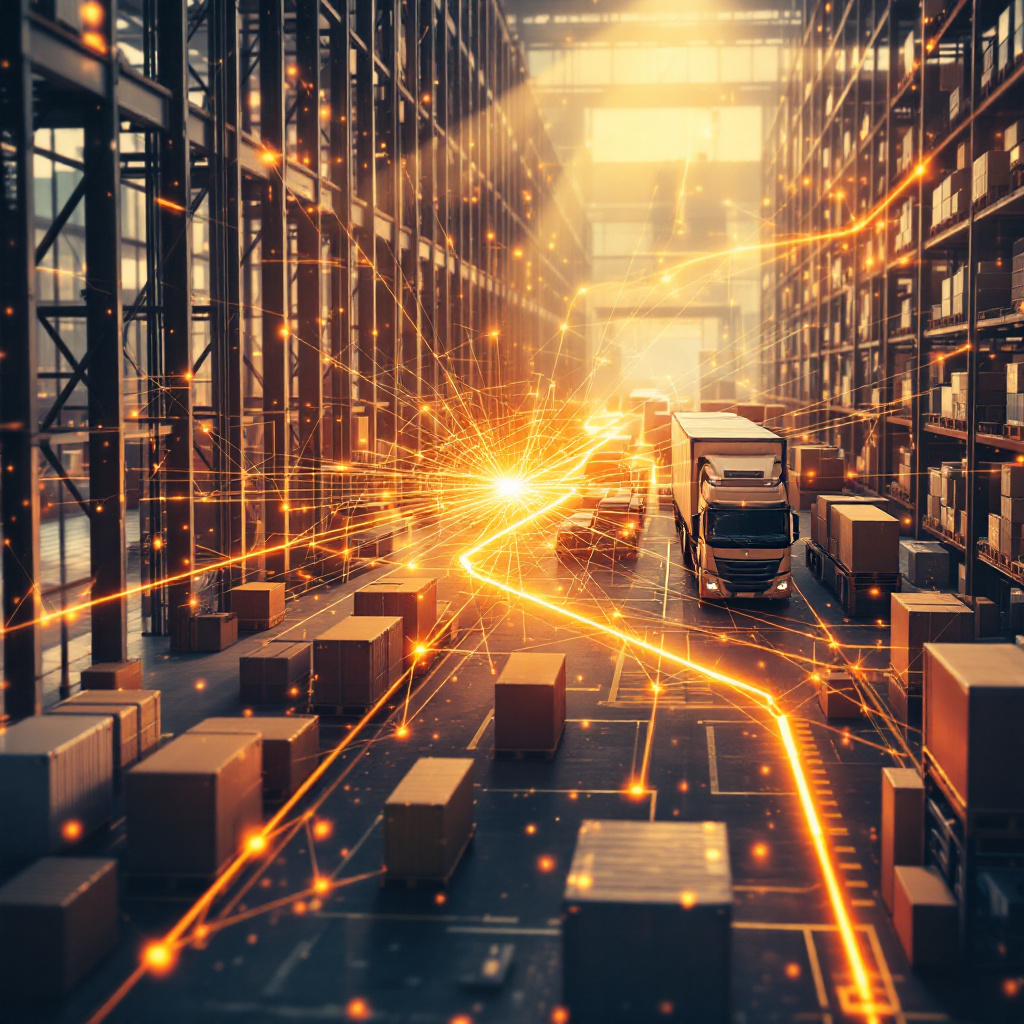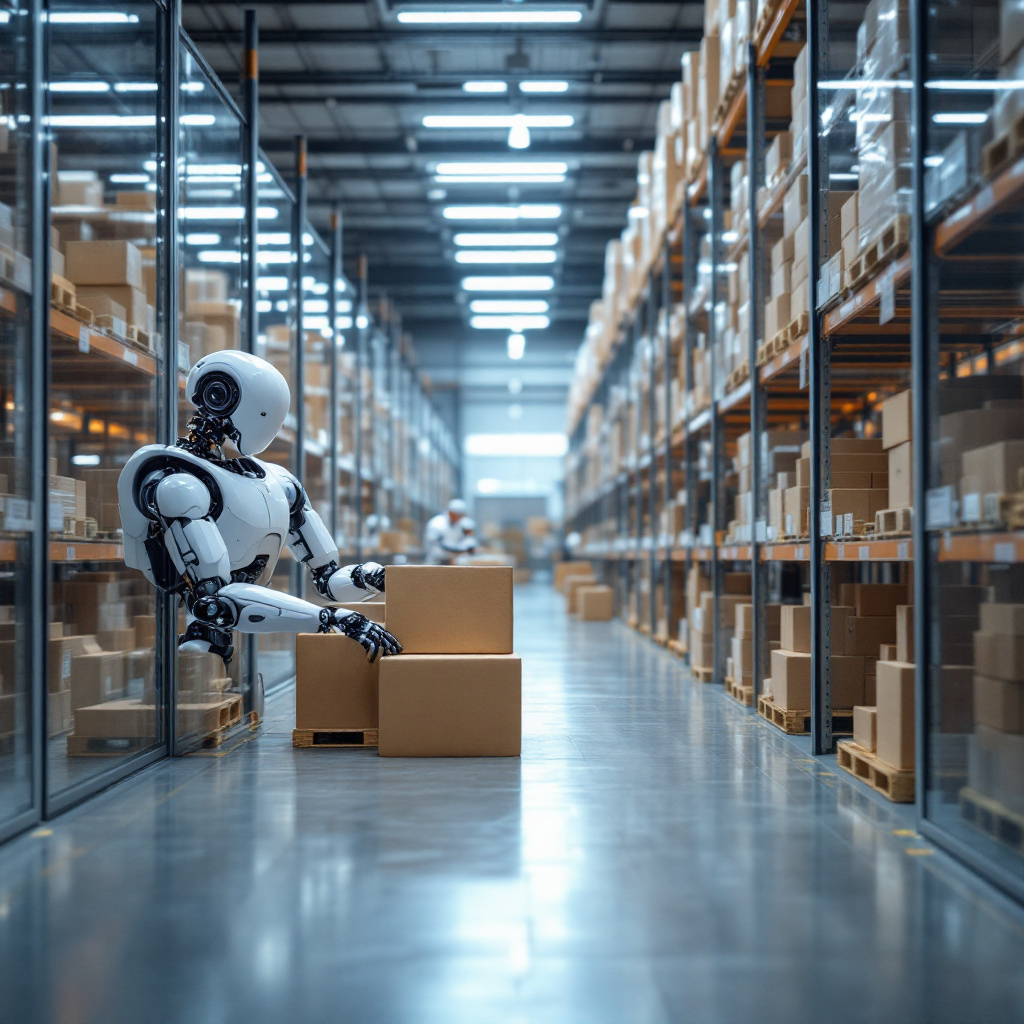The Role of AI in Logistics Communication
AI in logistics communication focuses on the smooth transfer of information between suppliers, carriers, warehouses, and customers. This is achieved through natural language processing (NLP), machine learning, and intelligent automation. By using AI systems, logistics teams can connect disparate data sources and respond faster to operational changes. The role of AI in logistics is to ensure accurate, timely, and efficient communication across the entire logistics process.
One common example is AI handles enquiries through chatbots and virtual assistants. These tools can provide shipment status, expected delivery times, and warehouse updates in real-time. AI improves the speed of response and reduces human error. For instance, AI could connect tracking data from multiple carriers and provide a unified view instantly. When powered by AI, such solutions can notify customers of delays before they occur, streamlining customer communication and improving satisfaction.
Predictive analytics plays an essential part in this process. AI algorithms can assess historical and real-time data to predict potential disruptions. This allows logistics companies to adjust schedules proactively. MIT Sloan points out that artificial intelligence is creating unparalleled new opportunities for logistics and supply chain management by improving communication and integrating multiple data points. This ensures that everyone involved in the supply chain can make decisions based on comprehensive, up-to-date information.
For operational teams overwhelmed by email-based communications, platforms like AI agents for Outlook and Gmail help logistics by automating replies grounded in ERP, TMS, WMS, and other connected systems. AI streamlines the flow of information so that logistics professionals can focus on decision-making rather than manual information gathering. AI makes it easier to manage large volumes of enquiries while maintaining consistent response quality.

AI-Driven Logistics: Benefit of AI and Automation in Logistics
The benefit of AI in logistics is evident in measurable improvements across delivery accuracy, cost efficiency, and speed. Research shows that the AI in logistics market was valued at USD 11.61 billion in 2023 and is projected to grow at a CAGR of 45.93% until 2032. This surge is due to the adoption of AI-driven systems capable of accurate delivery-time predictions and reduced delays. AI can accurately anticipate disruptions, enabling schedules to be adjusted in advance.
Automation in logistics eliminates repetitive tasks that consume valuable time. AI tools answer routine status queries, send automated invoices, and trigger real-time updates whenever a shipment status changes. When AI to automate such processes is implemented, logistics costs decrease due to reduced labour hours and fewer errors. Case studies from carriers and warehouses show operational expenses falling after AI integration. AI enhances not only internal communication tools but also customer-facing updates.
AI is being used to optimise operational flows in a way that supports logistics and delivery systems. For example, AI solutions can route shipments more effectively based on live traffic and weather data. AI delivers improvements in performance by integrating with existing fleet and inventory management. A recent report noted that AI improves delivery time predictions and reduces the risk of delays, resulting in higher customer satisfaction and more efficient logistics.
Platforms like virtualworkforce.ai reflect how AI with existing logistics software can drastically reduce email handling times, leading to faster resolutions for shipment exceptions. AI also supports automation by ensuring replies are accurate and aligned with business rules.
Drowning in emails? Here’s your way out
Save hours every day as AI Agents draft emails directly in Outlook or Gmail, giving your team more time to focus on high-value work.
AI Integration across the Supply Chain
Integrating AI across the supply chain means connecting legacy logistics software with modern APIs and cloud technologies. AI integrates disparate data sources such as ERP, TMS, and WMS into unified dashboards. However, data interoperability challenges can arise when different logistics providers use incompatible systems. AI integration strategies focus on ensuring all stakeholders have access to reliable, real-time data throughout the supply chain.
Best practices for implementing AI in logistics include phased roll-outs and staff training. AI can help logistics teams gradually adapt to new processes while ensuring minimal disruption to daily operations. Implementing AI solutions may also require setting internal data standards to avoid mismatches between systems. AI reduces the friction between transport management systems and inventory management platforms, enabling logistics teams to make well-coordinated decisions.
When integrating AI, it’s essential to address data privacy and compliance needs. Guides such as data security in logistics AI tools provide steps for protecting sensitive operational information. AI implementation also benefits from directly connecting with IoT sensors for real-time location and asset tracking, enabling logistics teams to react promptly if anomalies occur. This integration of AI within operational workflows ensures that transport, fulfilment, and warehousing are synchronised efficiently across the logistics sector.
Here’s how AI can help: a cloud-based AI model aggregates data from manufacturers, trucks, and ports, then updates all linked systems instantly when changes occur. This AI streamlines processes, helps logistics avoid delays, and connects all layers of the supply network.

AI Agents to Automate Operations
AI agent technology in logistics describes autonomous systems that can make operational decisions such as routing, load planning, and warehouse picking without constant human oversight. These agents are designed to automate complex logistics tasks, allowing logistics firms to focus on exception management and strategic planning. AI makes schedules more efficient by balancing routes in real time, taking into account traffic, driver hours, and delivery priorities.
AI with IoT integration offers benefits for both transport and storage. IoT sensors feed location, temperature, and loading data into AI models that can accurately predict risks or optimise warehouse space. AI can help logistics teams in predictive maintenance, avoiding unexpected downtime for vehicles and equipment. Robotic Process Automation (RPA) driven by AI streamlines administrative work such as customs documentation and billing.
In email communications, AI to automate responses ensures customers and partners receive timely information. Solutions such as virtual assistant tools for logistics companies can triage incoming requests, identify their context, and produce suitable replies instantly. This kind of AI automation means logistics providers can respond faster while maintaining personalised service. AI makes operations faster, more reliable, and leaves room for logistics professionals to engage with higher-value work.
By adopting AI technologies gradually and integrating AI agents into daily operations, logistics companies can cut delays, lower costs, and improve service levels. AI improves both planning and execution, delivering a significant return on investment and reshaping the logistics landscape as it moves toward an AI-powered logistics future.
Drowning in emails? Here’s your way out
Save hours every day as AI Agents draft emails directly in Outlook or Gmail, giving your team more time to focus on high-value work.
Future of AI in Logistics: Transforming Logistics
The future of AI in logistics will be shaped by rapid advances in connectivity, computational power, and automation. Technologies such as 5G, edge computing, and digital twins will allow AI to simulate, monitor, and manage logistics operations with unprecedented precision. This evolution is transforming logistics into a highly adaptive, data-driven industry.
Autonomous vehicles and drones are set to improve last-mile delivery. AI enhances these systems by providing optimised navigation, load balancing, and hazard detection. AI-enabled demand forecasting will help logistics providers adjust capacity, pricing, and route planning dynamically. As AI is making logistics more responsive, AI implementation will focus on increasing network transparency and resilience.
The AI in logistics includes generative AI capabilities for scenario modelling, allowing logistics companies to test multiple strategies before committing resources. By integrating AI into planning, companies can reduce logistics costs, minimise delays, and maintain high service quality. A recent academic study states that the human-machine interface is increasingly attracting attention, showing how AI allows better collaboration between people and technology across the logistics sector.
AI integration will also focus on enabling logistics teams to handle fluctuations in demand efficiently. Digital twins will give operators a live model of logistics operations for rapid adjustments. AI with existing management systems will continue making logistics more adaptive. The future of logistics will involve greater collaboration between AI agents and human decision-makers, ensuring efficient logistics across the supply chain.
Impact of AI: Automating Logistics Email
In the modern logistics environment, email remains a key communication channel. The impact of AI on logistics email is profound. AI to automate order confirmations, status updates, and delay notifications reduces manual workloads significantly. NLP-powered tools can automatically triage, summarise, and escalate urgent email cases to the right teams. This use of AI shortens response times and raises service consistency.
Solutions like virtualworkforce.ai show how AI can help logistics firms process high volumes of customer communication without sacrificing quality. AI provides responses grounded in up-to-date data from multiple connected systems. This means AI ensures accuracy and relevance in every reply. AI can help prioritise messages that need immediate attention, enhancing operational agility.
When AI handles repetitive communications, logistics providers not only improve customer satisfaction but also free human resources for more complex issues. Implementing AI in logistics for email workflows can cut per-email handling time by more than half, reducing costs and improving turnover times. AI delivers measurable service improvements, making logistics communication faster and more reliable.
By adopting AI-powered solutions for logistics email, logistics companies keep service levels high during peak demand periods. AI brings control, speed, and accuracy to everyday communications, enabling logistics teams to operate more efficiently across the logistics sector.
FAQ
What is AI in logistics communication?
AI in logistics communication uses technologies like NLP and machine learning to improve how information is exchanged between logistics stakeholders. It reduces delays and errors by providing real-time, automated updates.
How does AI improve delivery times?
AI can accurately predict delays and adjust delivery schedules proactively. This helps logistics providers reduce missed deadlines and run more efficient operations.
What are the main benefits of AI automation in logistics?
AI reduces manual workloads, cuts operational costs, and strengthens customer communication. It also enables proactive adjustments through predictive analytics.
Can AI integrate with existing logistics systems?
Yes, AI integrates with ERP, TMS, WMS, and other management systems through APIs or connectors. This unifies operational data for better decision-making.
How can logistics companies start implementing AI?
Companies should begin with pilot projects and staff training. Selecting AI tools that integrate easily into current workflows is crucial for smooth adoption.
Is AI in logistics expensive to adopt?
Initial costs vary, but efficiency gains often lead to quick returns on investment. Over time, AI reduces operational costs substantially.
How does AI handle customer communication?
AI tools can customise and automate responses based on accurate, real-time data. This ensures speed and consistency in customer interactions.
Can AI agents replace human workers in logistics?
AI agents automate many repetitive tasks, but human oversight remains essential for complex or sensitive issues. AI works best as a support tool.
What is the future of AI in logistics?
The future will see AI adoption grow with autonomous vehicles, drones, and digital twin technologies. These advances will further improve speed and efficiency.
How secure is AI in handling logistics data?
Security depends on the provider’s safeguards. Choosing AI systems with strong privacy and compliance measures is essential for protecting sensitive logistics data.
Ready to revolutionize your workplace?
Achieve more with your existing team with Virtual Workforce.